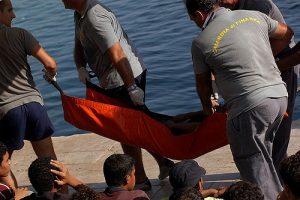October 3, 2013 marked a black chapter in the history of the small East African nation of Eritrea – a country that gained its independence from its larger neighbour, Ethiopia, in May 1991. For Eritreans, the dreams and aspirations of living in a country liberated from centuries of successive colonialist regimes soon faded out. Freedom fighters, the Eritrean People’s Liberation Front, who were revered as the messiahs of change, wasted no time in becoming the next big thing in the world of tyranny.
Following years of random disappearances, a mandatory national military service that runs indefinitely for the 18-40 year olds, and with very little prospects of self-progression, the country’s young population began to stream across the border into neighbouring countries in Biblical proportions. This is a despite a shoot-to-kill policy against anyone spotted crossing the borders. The government runs the country as one big prison cell, and leaving the country is considered as an illegal act.
None of that has deterred Eritreans from braving the risks against the backdrops of that shoot-to-kill policy, heat exhaustion in the Sahara desert, capture by ISIS militants in Libya and drowning in the Mediterranean Sea to make it to Europe. UNHCR estimates around 4,000 Eritreans flee the country every month. For a country home to about five million people and, with almost half of that population already living in the diaspora, those figures are worrying.
Chris Cotter, an American director, produced a documentary on the Eritrean exodus in 2015, shedding further light on the plight of Eritreans.
On October 3, 2013, the eyes of the world turned to the Italian island of Lampedusa where a small fishing boat with hundreds of Eritrean migrants on board capsized 400 metres off the coast. According to the International Organisation for Migration, the official death toll was put at 368. Those figures include a mother with her three children and another pregnant mother who went into labour and gave birth in the process of drowning. The Lampedusa tragedy is not a separate incident. Since October 2013, at least 10,000 migrants are believed to have died in the Mediterranean. The United Nations refugee body and the IOM had put the death toll at 700 in June 2016 alone.

Here below, Dr. Gerard Prunier – a historian who specialises in the Horn of Africa – presents an in-depth analysis into what went wrong and how things went from bad to worse.
The Human Rights Council set up the Commission of Inquiry on Eritrea in June 2014 to investigate human rights abuses in the country. The commission was never allowed access into Eritrea after the government there accused it of being biased and compromised. The commission then went on to interview Eritrean refugees in 13 other countries in Africa and Europe to hear first-hand accounts of what took place in prisons and national service camps in Eritrea. Following almost two years of investigations, the Commission of Inquiry on Eritrea presented its second report in June 2016 in Geneva, Switzerland.
Addressing the 32nd session of the Human Rights Council, the Chairperson of the Commission of Inquiry, Mr. Mike Smith said, “We presented our first report to you 12 months ago, documenting a multitude of human rights violations in Eritrea. The Human Rights Council unanimously approved – without a vote – a resolution – and mandated the Commission to determine whether these violations might amount to crimes against humanity and to address the issue of accountability. The Commission has concluded that Eritrean officials have committed crimes against humanity. The crimes of enslavement, imprisonment, enforced disappearances, torture, persecution, rape, murder and other inhumane acts – have been committed as part of a widespread and systematic campaign against the civilian population since 1991. The aim of the campaign has been to maintain control over the population and perpetuate the leadership’s rule in Eritrea.”
Outside the offices of the United Nations where the meeting took place, around 16,000 Eritreans who now live across Europe held a peace rally to show their support to the findings of the commission, furthermore calling for the government officials in Eritrea to be tried at the International Criminal Court in The Hague.
As the tides begin to change in favour of change, there is a genuine feeling within the opposition camp that the regime in Eritrea is gradually cracking up from within and that sooner or later, the tyrannical order will come tumbling down like a house of cards.
